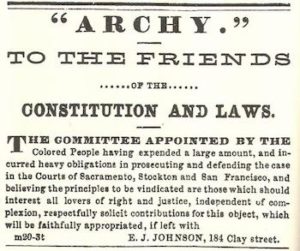
*On this date in 1858, a Black man, Archy Lee, was freed in California. Archy Lee was a Black slave in Mississippi owned by his white-American owner, Charles Stovall.
Stovall brought Lee to Sacramento, California, on October 2, 1857. While in California, Stovall rented out Lee for his wages. In January 1858, when Stovall decided to return to Mississippi, Lee, age 18, escaped from Stovall en route to the bay and returned to Sacramento. Lee took refuge in the home of Charles Hackett and Charles Parker, two politically active Blacks in Sacramento who operated a hotel, the Hackett House. Stovall had Lee arrested, but attorney Edwin B. Crocker defended Lee. On January 26, 1858, Judge Robert Robinson ruled that Lee was a free man because California was a free state. Stovall had become a permanent resident of California and thus could not own slaves.
However, Judge Robinson's decision was appealed to the California Supreme Court. On February 11, 1858, the Court ruled that Stovall's inexperience and poor health warranted an exception for him to leave the state with Lee as his property. Peter Burnett authored the Supreme Court decision. Justice Burnett's decision was joined by Justice David Terry, a southern Democrat who would flee California the following year after killing an abolitionist, David Broderick, in a duel. Californians were outraged by the California Supreme Court decision. On March 5, 1858, although legally successful, Stovall tried to sneak Lee out of the state by boat. Abolitionists and San Francisco police discovered the plan and climbed aboard the Orizaba (a ship) to rescue Lee. Stovall was arrested for kidnapping, a charge which challenged the California Supreme Court's decision that Lee was Stovall's property.
In March 1858, a federal court, the U.S. District in San Francisco, overturned the California Supreme Court decision, holding that Lee was a free man. Stovall then argued to United States Commissioner William Penn Johnson that Lee violated the 1850 National Fugitive Slave Law. Still, on April 14, 1858, a year after the Dred Scott Case, a final trial held that Lee had crossed no state lines to escape, and Lee was finally declared a free man. According to the Sacramento Daily Union, Archy Lee's case was the first ever presented in California. Lee took advantage of his freedom and moved to Canada during the Frazier River Gold Rush in 1858. He is believed to have died in British Columbia, Canada in 1873.